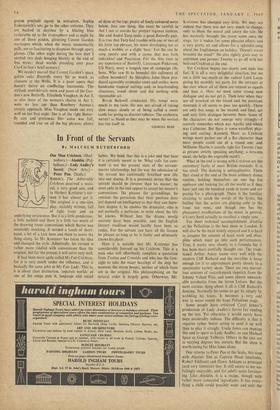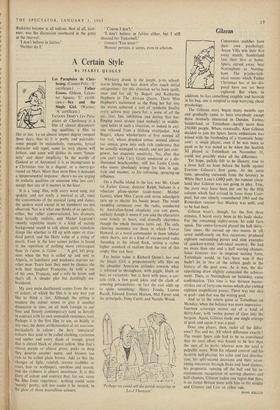In Front of the Servants
By MALCOLM
RUTHERFORD
Our Man Crichton. (Shaf- tesbury.)—Aladdin. (Pal- ladium.)—Lady Audley's Secret. (New Arts.)— Peter Pan. (Scala.) BARRIE'S The Admirable Crichton deserved a musi- cal, a very good one, and in Herbert Kretzmer's ver- sion it has almost got it. The original is a one-idea play, stylishly written, full of light irony and an underlying seriousness. But it is a little ponderous, a little padded and there is a little too much of the drawing room conventions which Barrie was ostensibly mocking. It needed a touch of short- hand, a bit of a kick here and there to move the thing along. So Mr. Kretzmer has taken the idea and changed the style. Admittedly, his version is rather more riddled with conventions than the original, but for the present it will serve very well.
It had been more aptly called My Fair Crichton, for it is very much under the influence, and is basically the same joke as My Fair Lady. That is, it is about class distinction, 'separate worlds' as one of the songs puts it, language and social habits. We think that this is a joke and that here it is certainly meant to be. What calls for-com- ment is not the present state of the servant- master relationship, but the way the admission of the servant has continually breathed new life into our drama. It is a perennial device that the servant should be cleverer than his master; he must only in the end appear to accept his master's conventions. He pleases the • groundlings, he reminds the patricians that their position does not depend on intelligence so that they can there- fore despise it, he enables the dramatist, who is not normally a patrician, to write about the life he knows. Without him the drama would scarcely have been possible, and the English literary tradition would hardly have been so comic. For the servant can have all the licence he pleases so long as he is funny and ultimately knows his place.
Here it is notable that Mr. Kretzmer has considerably Jeevsed up his Crichton. This is a man who will effortlessly complete a quotation from Troilus and Cressida and who has the fore- sight to take the exact bearings of the ship the moment the storm breaks, neither of which feats are in the original. His philosophising on the natural order is largely gone. Otherwise, Mr. Kretzmer has changed very little. We may- say indeed that there was not very much to change, only to blunt the moral and adorn the tale. He has naturally brought the storm scene onto the stage, for it makes for some pleasant effects and a very pretty set and allows for a splendid,song about the Englishman on holiday, 'Doesn't travel broaden the mind?' He also rightly gives way to sentiment and permits Tweeny to go off with her beloved Crichton at the end.
Yet Crichton begins too slowly and ends too fast. It is all a very delightful situation, but we see a little too much of the radical Lord Loam giving his monthly tea party for the servants at the start where all of them are treated as equals and hate it. Here we need some strong new dialogue and do not get it. Then later when they are all wrecked on the island and the positions reversed, it all seems to pass too quickly. There are only five songs in the second, and final, act and very little dialogue between them. Some of the characters do not emerge very strongly—I scarcely remember which was Agatha and which was Catherine. But there is some -excellent play- ing and casting. Kenneth More as Crichton wrings more pathos out of a flat character than most people could out of a round one, and. Millicent Martin is exactly right for Tweeny ('not at present strictly speaking anything; a between maid; she helps the vegetable maid').
What in the end is wrong with Crichton are the customary faults of most British musicals. It is too small. The dancing is unimaginative. There they stand at the end of the most ordinary dame routine, holding themselves on one leg for applause and looking for all the world as it' they have just run the hundred yards in evens and are posing for a photograph. There is the familiar straining to catch the words of the lyrics, the feeling that the actors are playing only to the front few rows, and though one has the pleasantest recollections of the music in general, it's very hard actually to recollect a single tune.
For sheer technical accomplishment Aladdin at the Palladium is the best show in London. It will also be the most widely enjoyed and it is hard to imagine the amount of hard work and disci- pline which must go into such performances. True, it works very closely to a formula but it has been most carefully thought out. The tradi- tional Arthur Askey teams very well with the modern Cliff Richard and the storyline is loose enough for it to approximate pretty closely to a spectacular variety show. There are two marvel- lous sessions of custard-pieish slapstick from the Johnny Volant FiVe, and some almost unwatch- able acrobatics from the Seven Lukacs. But the most curious thing about it all is Cliff Richard's dancing. Normally he seems to get by simply by wobbling his knees. It becomes a very odd way to move round the huge Palladium stage.
Some people have criticised Caryl Jenner's production of Lady Audley's Secret for sending up the text. Yet otherwise it would surely have been intolerably tedious. The difficulty is that it requires rather better acting to send it up well than to play it straight. Usula Jones can manage this and to spare as Lady Audley, so can Michael Spice as George Tallboys. Others in the cast are to varying degrees less certain. But the show is worth seeing for Miss Jones alone.
One returns to Peter Pan at the Scala, this time with Alastair Sim as Captain Hook (matindes, Robert Eddison) and Pawn Addams as principal (and very feminine) boy. It still seems to me un- failingly enjoyable, and for adults quite fascinat- ing. Like Aladdin, it is a recipe, though with rather more concealed ingredients. It has every- thing a child could possibly want and only the Redskins become at all tedious. Best of all, how- ever, was the discussion overheard in the gents at the interval: 'I don't believe in fairies.'
'Neither do I.' "Course I don't.' 'I don't believe in fairies either, but I still shouted for Tinkerbell.'
(omnes) 'You never!'
Honour persists, it seems, even in atheism.































 Previous page
Previous page